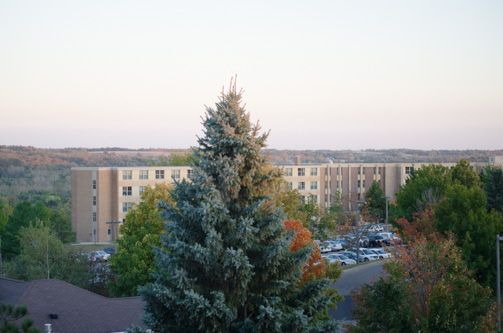Gustavus has always lauded their status as a four-year residential college, where students have to live on campus unless they fit special criteria or get permission. However, as of late, students have been wondering if it is something the college should be bragging about, or if it is a time for a change.
Junior Alex McHugh is currently living in complex for the second straight year. While he thinks it is fine for sophomore students, he did not enjoy spending his junior year stuck in the dorm. He was looking forward to getting an apartment senior year but when room draw came around, to his horror, he would again be assigned to either complex or Sohre.
“Right now me and another senior are in a double and are on the waiting list for every upgrade available. The doubles on campus are just not adequate enough for two adults to be living in. It’s just not fair. I mean they have two people that have been going here going on four years living in a space smaller than the offices that the faculty work in,” McHugh said.
McHugh isn’t opposed to the idea of a four-year residential college, just the shortage of upperclassmen apartments.
“I honestly think the on campus community living isn’t a bad idea. The community is great and it’s fun to just walk down the hall and be with friends. The upperclassmen living just isn’t up to par with what you can find at other schools, or off campus,” McHugh said.
When enrollment was higher at Gustavus a few years ago, all the on-campus housing would fill up, so the school would let more upperclassmen off of campus, which would cause a domino effect, giving most all seniors off-campus options or on-campus apartments. Juniors would then sweep up the remaining apartments, as well as getting some higher-end dorms, such as quads and triples. However, as enrollment has fallen, there have been less people allowed off-campus, and the whole effect is reversed, now even to the point where Seniors can’t get apartments, and must live in dorms meant for underclassmen.
Junior Chris Nelson was hoping to get to experience apartment living next year, but instead finds himself living in Uhler again. “I do not feel this living situation is fair. Being a 4-year residential college is a major drawback. Especially with the situation this year where next year’s seniors are currently assigned Uhler rooms, or worse. Ever since my freshman year, it was expected that almost all seniors (even with a junior or two) would be able to obtain housing in an apartment, suite, or off-campus.” Nelson said.
Nelson would argue that the college should put more emphasis on better living conditions than on filling all the dorms to get money.
The housing situation has worsened over the past year or two. This leads to increased frustration among all students. It is understandable that all rooms need to be filled in order to maintain financial viability, but for the overall campus climate, a more lenient housing policy allowing more students off campus would be beneficial.
One way students have found a loophole to live off campus is paying for a cheap dorm, and also renting a house off-campus.
Junior Anders Raarup currently pays for a dorm in complex, but has lived off campus all year. He intends to do the same next year.
“I feel like it’s worth it to pay for both housing options, but it is ridiculous that it has to come to that,” Raarup said.
Raarup, unlike McHugh, cannot fully embrace the concept of a four-year residential college.
“From my point of view, and I know many other students would agree, it is pretty ludicrous that the administration has the desire to treat young adults in a childish manner when it comes to student housing by making them live on campus as seniors. I feel that it is more beneficial for students to learn how to grow up in the real world as opposed to being confined to a box at the age of 21,” Raarup said.
Amidst all the frustrations about the housing policy, there are a lot of passionate students with ideas for change.
“A big wish for most of the student population is more off-campus housing which will ultimately lead to more upperclassmen in apartments or their preferred housing. Gustavus already showed improvement by this year by increasing the availability of singles,” Nelson said.
Students also expressed a wish for the housing policy to be amended to allow for more upperclassmen students to be let off campus, despite the initial financial hit the school would take.
“I think the school would get its money back eventually, because more students would want to come,” Raarup said.
If the housing policy does not adapt, students fear that less and less prospective students will choose Gustavus, adding to the problem of filling the dorms.
“I’ve known a couple people who have transferred out of here because of the housing. It’s a huge turn off, not to mention expensive. At this moment I would never tell anyone to come here solely based on the living situation,” McHugh said.
“The housing policy has a negative impact on Gustavus. Many prospective students or incoming freshman are unaware that Gustavus is a 4-year residential college. This can be a major factor in deciding a college, knowing that you might be living in sub-par campus housing as an upperclassman,” Nelson said.
